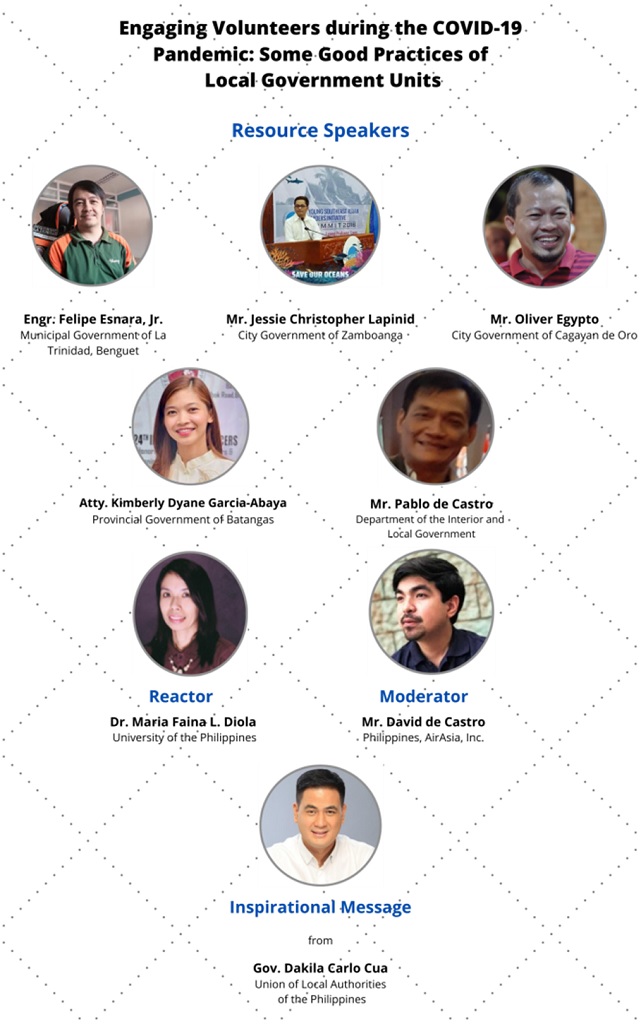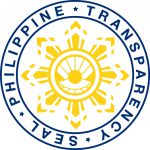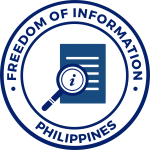As the country continues in its fight against COVID-19, the Local Government Units (LGUs) face the daunting task of addressing its impact, especially since they take the lead in fighting the pandemic. And many LGUs have proven and continue to prove that they are indeed ready to face their huge opponent, as they are armed not only with the necessary skills, knowledge and resources, but also with volunteers as their partners.
This was the main focus of the webinar hosted by the Philippine National Volunteer Service Coordinating Agency (PNVSCA) held last September 3, 2020. Entitled “Engaging Volunteers during the COVID-19 Pandemic: Some Good Practices of Local Government Units”, the webinar served as a venue for sharing experiences, innovations, challenges and good practices of some of the LGUs who adopted volunteerism as a strategy in their COVID-19 response projects and activities.
PNVSCA Executive Director, Mr. Donald James D. Gawe, opened the webinar by stating that “volunteerism is innate among Filipinos, but this spirit of volunteerism is currently put to the test because of the pandemic”. He added that, although many individuals are interested to volunteer, there still remains a challenge of mobilizing them due to fear and the lack of information on where and how they can engage. Despite these challenges however, Director Gawe stressed that many organizations are already involving volunteers to help address the impact of COVID-19. He emphasized that sharing experiences in adopting volunteerism through the webinar may help mobilize more individuals and groups to volunteer as well as encourage more LGUs to use volunteerism as part of their development strategy.
Governor Dakila Carlo E. Cua, President of the Union of Local Authorities of the Philippines (ULAP) and Governor of the Province of Quirino, highlighted in his inspirational message that responding to COVID-19 would have been seriously difficult without the support of volunteers, and cited some samples of volunteer work done by students, youth, individuals, groups, NGOs and business establishments. He further stressed that volunteers are integral partners of the national and local governments, and without the volunteers, we will be a nation without character.
The experiences presented by the speakers showed how they have been able and continue to effectively manage COVID-related concerns through the unwavering support of volunteers.
The Municipal Government of La Trinidad, Benguet, represented by Engr. Felipe P. Esnara, Jr., Local DRRM Officer II, presented the of set protocols and adopted standards formalized through circulars and ordinances which, among others, accredit different groups extending assistance to the LGU. He also highlighted the training, protection and recognition of volunteers, which forms part of their COVID-19 Recovery and Resiliency Plan.
The City Government of Zamboanga represented by the Chief for Research Evaluation and Statistics Division, Mr. Jessie Christopher B. Lapinid highlighted their people empowerment programs where they engage the active participation of their citizens, leading to increased trust in the government.
As for the City Government of Cagayan De Oro, Mr. Oliver V. Egypto, Head of Office for Community Affairs and Head of Governance Cluster – Emergency Operations Center, stressed that volunteerism is not demanded but nurtured, thus many individuals continue to volunteer in the different programs and activities of the local government even if they themselves are also experiencing difficulties. He also emphasized the need for LGUs to be proactive in looking for areas of intervention.
Atty. Kimberly Dyane Garcia-Abaya, Chief, Research and Planning Division of the Batangas Provincial Disaster Risk Reduction and Management Office, shared that volunteers participate actively in their project meetings and actual activities in response to the Taal Volcano eruption and during this pandemic.
Among the other activities where the four (4) LGUs engage their volunteers include packing and distribution of relief goods, donation and preparation of treatment and containment facilities, cleaning and disinfection, donation of cash and in-kind assistance, data analytics and plan preparation, household visits, and provision of psychosocial support. The LGUs also provide their volunteers with insurance by enrolling them in Philhealth and the Philippine Red Cross.
Also invited in the forum is the Department of the Interior and Local Government (DILG), through Mr. Pablo C. de Castro, Chief of the Local Government Relations Division, who presented the draft Memorandum Circular for Mobilization of CSOs in COVID-19 Related Response and Recovery Program of the Government, which he stressed, is still open for comments.
Dr. Maria Faina L. Diola, Asst. Professor and Former Director of UP-NCPAG’s Center for Leadership, Citizenry and Democracy, gave a brief reaction and commended the four (4) LGUs for their inspiring, forward-looking and laudable practices.
The webinar was moderated by Mr. David F. de Castro, Country Communications Head of AirAsia Philippines, who also provided the synthesis. It was made inclusive for persons with hearing and speech impairment through the sign language done by Ms. Ma. Teresa Buenaventura and Mr. William I. Sidayon, Jr., both from the College of Saint Benilde – School of Deaf Education and Applied Studies (SDEAS). The online forum made available via zoom and facebook live was attended by around 430 participants from almost all regions nationwide. This webinar is part of PNVSCA’s webinar series which aims to create public awareness and recognition of volunteerism towards social and economic development, especially during this time of the COVID-19 pandemic.

The author is currently the Senior Volunteer Service Officer of the Policy, Advocacy and Technical Services Division (PATSD), Philippine National Volunteer Service Coordinating Agency.
Visit PNVSCA website (www.pnvsca.gov.ph) and PNVSCA Facebook (facebook.com/PNVSCA) for other stories and information on volunteering.




